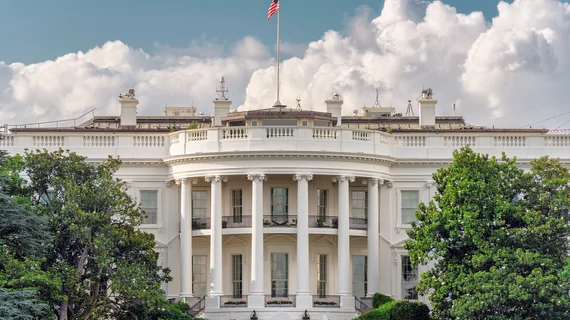President Biden issues ‘landmark’ executive order on artificial intelligence
President Joe Biden issued what the White House is calling a “landmark” executive order related to artificial intelligence on Monday.
The proclamation is aimed at ensuring that America “leads the way” in both seizing the promise and managing risks stemming from AI. In particular, the order would establish new standards for AI safety and security, protect individuals’ privacy, advance equity, “stand up” for consumers and workers, and promote innovation and competition.
“AI is all around us,” Biden said Oct. 30 before signing the order, according to the Associated Press. “To realize the promise of AI and avoid the risk, we need to govern this technology.”
Relevant to radiology, the order calls for the responsible use of AI in healthcare. Health and Human Services plans to establish a safety program to receive reports of, and act to remedy, unsafe healthcare practices involving AI. Biden also is calling for the development of principles and best practices to mitigate the harms and maximize the benefits of AI for workers. This would include addressing job displacement, labor standards, workplace health and safety, and data collection.
“These principles and best practices will benefit workers by providing guidance to prevent employers from undercompensating workers, evaluating job applications unfairly, or impinging on workers’ ability to organize,” the order noted.
The administration also wants to “catalyze AI research across the United States.” It hopes to do so through a pilot of the National AI Research Resource, a tool that provides scientists with access to key resources, data and expanded grant opportunities. Such funding would focus on “vital areas” like healthcare and climate change, the White House noted.
In addition, the order would require developers of the most powerful AI systems to share their safety test results and other critical information with the government. President Biden is calling for the development of standards, tools and tests to ensure that AI systems are “safe, secure and trustworthy.” Equity and civil rights also are a key focus of the order.
“Irresponsible uses of AI can lead to and deepen discrimination, bias, and other abuses in justice, healthcare, and housing,” the order noted.
The Medical Imaging & Technology Alliance, which represents device manufacturers, praised the president's announcement on Tuesday. It also noted that the U.S. Food and Drug Administration already "rigorously regulates and assesses" device performance.
“Medical imaging manufacturers follow strict regulatory requirements to ensure AI-enabled medical devices are safe and effective,” Patrick Hope, MITA’s executive director, said in an announcement. “We welcome the president’s executive order, which should help to consistent oversight of FDA-regulated algorithms and those that currently aren’t. We look forward to working with the administration to foster innovation that improves patient care equitably.”
Read the full fact sheet from the White House here.
Editor's note: This story has been updated to include a comment from MITA.

